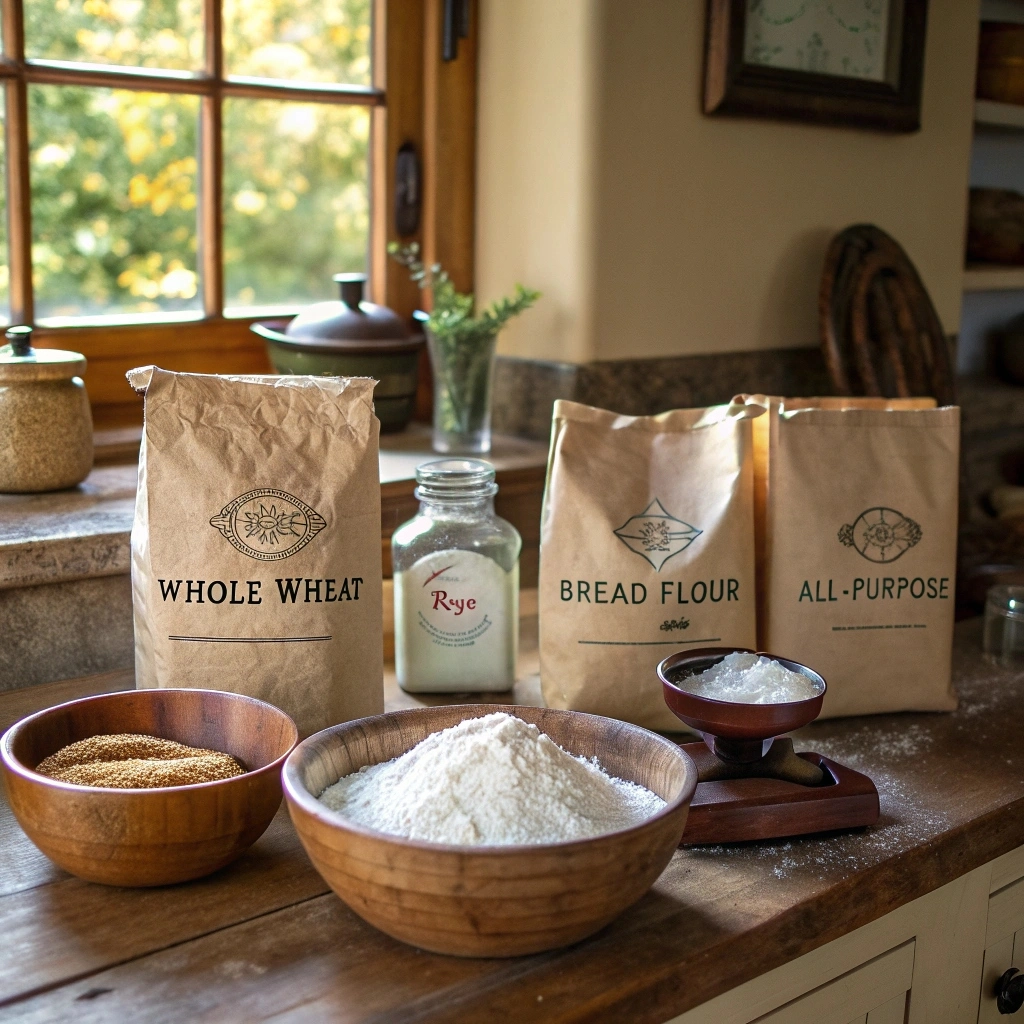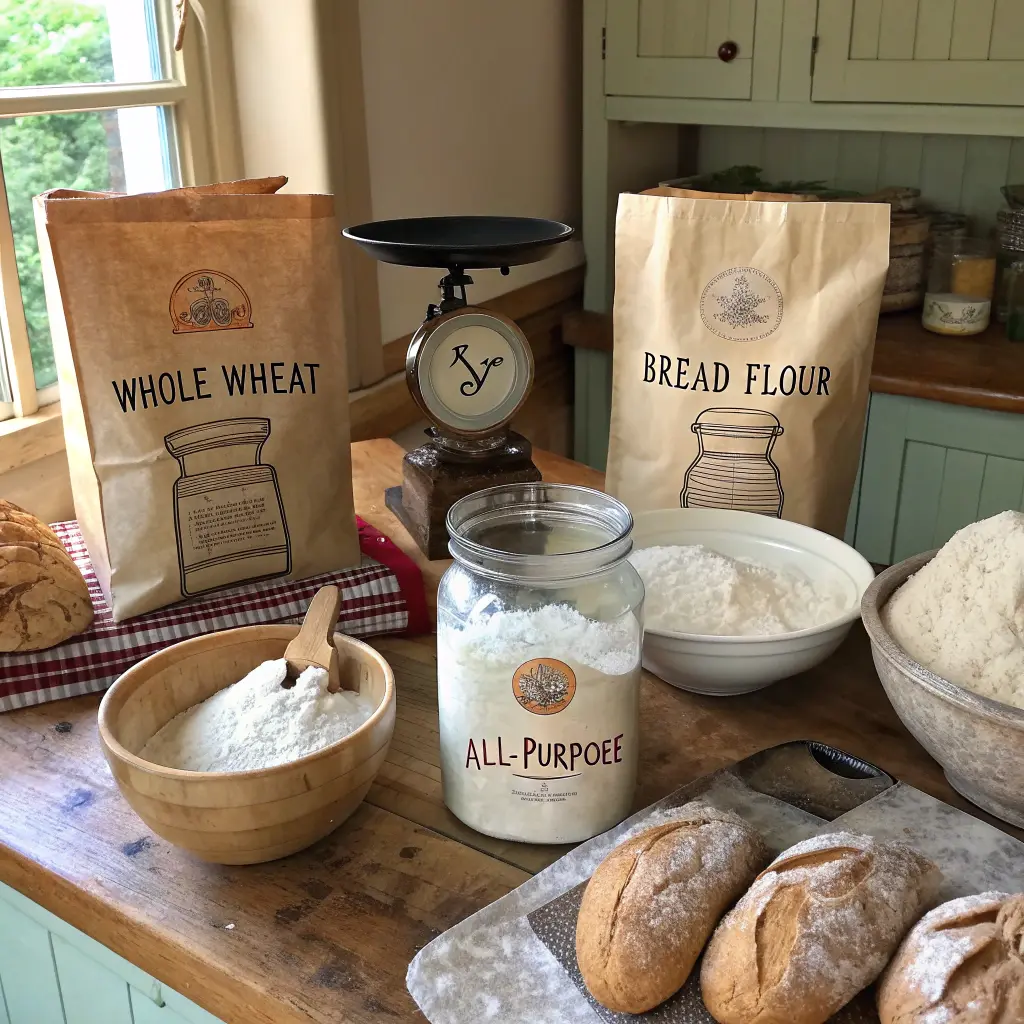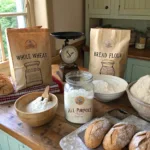Best flour for sourdough starter I wish someone had told me the answer when I first began my baking journey. In my early attempts, I grabbed whatever flour was in my pantry, hoping my starter would come alive. Instead, I ended up with sluggish bubbles, strange smells, and more jars of failed starter than I could count.
After several trials, a bit of research, and plenty of patience, I finally discovered that the flour you choose can make or break your sourdough starter. It’s not just about availability the right flour can speed up fermentation, create a more robust culture, and give you bread with richer flavor and better texture. In this guide, I’ll share everything I learned so you can skip the frustrating mistakes and start with the perfect flour from day one.
TAbale OF CONTENTS
Best Flour for Sourdough Starter
Equipment
- 1 clean glass jar (at least 500 ml) with a loose-fitting lid
- Digital kitchen scale
- Spoon or small spatula
- Rubber band or marker (to track growth)
Materials
- 60 cup whole wheat flour or rye flour
- 60 cup bread flour (optional blend)
- 120 g Filtered water (room temperature)
- Clean glass jar with loose-fitting lid
Instructions
- 1. In a clean jar, mix 1 cup of your chosen flour with 1 cup filtered water until no dry spots remain.2. Cover loosely and leave at room temperature (70–75°F / 21–24°C) for 24 hours.3. Feed daily with equal parts flour and water by weight, discarding half before each feed.4. Continue feeding for 5–7 days until your starter doubles in size and has a pleasant, slightly tangy aroma.5. Store in the fridge if not baking daily, feeding once a week.
Notes
Nutrition
You can read more:
Sourdough Starter: The Complete Guide to Making, Feeding, and Fixing It

Why Flour Choice Matters for Sourdough Starter
Choosing the best flour for sourdough starter is not just about preference it’s the foundation of a healthy, active culture. Flour is the main source of food for the wild yeast and lactic acid bacteria that bring your starter to life. The quality, type, and freshness of that flour can determine whether your starter becomes bubbly and strong or weak and sluggish.
When you use the best flour for sourdough starter, you provide the right balance of nutrients, minerals, and enzymes that microbes need to thrive. Whole grain flours like rye and whole wheat are packed with natural sugars and minerals that speed up fermentation, while bread flour offers a stable and consistent structure for long-term maintenance.
If you start your baking journey with the wrong flour, your starter might take days longer to develop or worse, never become strong enough to bake with. That’s why identifying the best flour for sourdough starter from the very beginning saves you time, prevents frustration, and ensures delicious results in your bread.
💡 Pro Tip: Use whole wheat or rye for the first few feedings, then switch to bread flour for stability. This combination often produces the strongest and most reliable starters.
Best Flours for Starting a Strong Starter
When you’re searching for the best flour for sourdough starter, it’s important to know that not all flours behave the same. Some encourage rapid fermentation, others offer stability, and some deliver unique flavors. The choice depends on your experience level, climate, and the bread style you want to bake.
Here’s a breakdown of the top options:
| Flour Type | Why It’s Good for Starters | Fermentation Speed | Flavor Profile | Best For |
|---|---|---|---|---|
| Whole Wheat | High in nutrients & minerals; great for kickstarting fermentation | Fast | Mildly nutty, earthy | Beginners starting from scratch |
| Rye Flour | Extremely nutrient-rich; encourages strong yeast activity | Very Fast | Strong, tangy | Boosting weak starters |
| Bread Flour | High protein; stable structure for consistent growth | Moderate | Neutral, slightly sweet | Long-term maintenance |
| All-Purpose | Accessible & easy to use; less nutrient-rich than whole grain | Slow-Moderate | Mild, clean | Everyday feeding once starter is mature |
| Gluten-Free | For gluten-intolerant bakers; needs extra care | Slow | Depends on grain blend | Specialized diets |

Recommendation for Beginners
If you’re new, the best flour for sourdough starter is whole wheat or rye for the first 3–5 days because they give your starter a nutrient boost. Once it’s active and bubbly, transition to bread flour for stability and predictable results
Pair this guide with How to Make a Sourdough Starter from Scratch for a full step-by-step process.
Whole Grain vs. Refined Flour
When deciding on the best flour for sourdough starter, one of the first choices you’ll face is whether to use whole grain or refined flour. Both can work, but they produce different results in terms of fermentation speed, flavor, and starter maintenance.
Whole Grain Flour
Whole grain flours such as whole wheat and rye contain the bran, germ, and endosperm of the grain. This means they are packed with vitamins, minerals, and natural sugars that feed your starter’s wild yeast and bacteria. The result is a faster, more vigorous fermentation, making them an excellent choice for kickstarting a new starter.
Pros:
High nutrient content for rapid fermentation
Rich, earthy flavor profile
Ideal for boosting weak or sluggish starters
Cons:
Can require more frequent feedings
May produce a denser texture in bread if used exclusively
Refined Flour
Refined flours such as bread flour and all-purpose — have had the bran and germ removed, leaving primarily the starchy endosperm. While this makes them lower in nutrients, they provide a stable, predictable environment for your starter once it’s mature.
Pros:
Consistent performance for long-term starter maintenance
Milder flavor
Easier to handle for beginners after initial growth phase
Cons:
Slower fermentation in early stages
Less nutritional variety for microbes
💡 Pro Tip: Many bakers find the best flour for sourdough starter is a combination starting with whole grain for the first few days, then transitioning to refined bread flour for stability
Organic vs. Non-Organic Flour
Choosing between organic and non-organic options is an important step when deciding on the best flour for sourdough starter. Many bakers believe that organic flour gives their starter a stronger, faster rise because it contains more natural nutrients and microorganisms. When you’re working to find the best flour for sourdough starter, starting with organic whole wheat or rye can give your culture a healthy boost from day one.
Organic flour is grown without synthetic chemicals, meaning your starter’s wild yeast and bacteria can thrive without potential inhibitors. This makes it a popular choice for those who want the best flour for sourdough starter in terms of purity and microbial diversity. On the other hand, non-organic flour can still work well, especially for maintaining an established starter, and it’s often easier on the budget.
If you want rapid fermentation, strong microbial activity, and cleaner flavor, organic whole grain is often considered the best flour for sourdough starter. But if consistency and cost are more important to you, a fresh, high-quality non-organic bread flour can still keep your starter healthy and active.
Want to save some of these recipes? Visit my Pinterest page, or Facebook page where I have a huge collection of the best sourdough recipes and information on the web.
How Protein Content Affects Fermentation
When looking for the best flour for sourdough starter, one detail that often gets overlooked is the flour’s protein content. Protein, primarily in the form of gluten, plays a big role in how your starter develops and how well it performs in baking.
Focuses on the “how” and “why”
The high protein content in flours like bread flour is the key to forming a strong, elastic gluten network.
This gives your starter more structure and helps it trap gases during fermentation, resulting in a bubbly, elastic culture. For many bakers, bread flour is part of the best flour for sourdough starter strategy once the culture is mature.
On the other hand, lower protein flours like all-purpose can still make a healthy starter, but fermentation may be slightly slower, and the starter might not hold its shape as well. This is why many recommend beginning with whole wheat or rye (both nutrient-rich and moderately high in protein) to kickstart activity, then transitioning to bread flour for long-term stability a combination often considered the best flour for sourdough starter approach.
💡 Pro Tip: Aim for flour with 11–13% protein for consistent performance. If the temperature is too low, your starter may be sluggish; if it’s too high, the texture can become runny or even soupy. overly elastic.
How Freshness of Flour Impacts Your Starter
When choosing the best flour for sourdough starter, freshness matters more than many bakers realize. Freshly milled flour contains more active enzymes, natural oils, and nutrients all of which feed the wild yeast and bacteria in your starter. More Active and Descriptive
This accelerates fermentation, resulting in a richer aroma and a more complex flavor profile.
If your flour has been sitting in the pantry for months, its oils may start to oxidize, and nutrient levels can drop. While you can still create a functional starter, it may take longer to become bubbly and active compared to one made with fresh flour. That’s why, for many, fresh-milled whole wheat or rye is considered the best flour for sourdough starter in the initial phase.
💡 Pro Tip: Store your flour in an airtight container, away from heat and light, to maintain freshness for as long as possible. Even if you can’t mill your own, buying smaller quantities more often ensures you’re feeding your starter the freshest possible flour a key factor in finding the best flour for sourdough starter for your baking.
Common Mistakes When Choosing Flour
One of the most frequent errors beginners make is not understanding what truly qualifies as the best flour for sourdough starter. Many opt for overly processed white flour, which lacks the nutrients and natural enzymes that help your starter thrive. Another common mistake is switching flours too often, which can disrupt the starter’s balance. Using flour that’s been bleached or has added ingredients can also slow down the fermentation process. avoid these pitfalls, focus on consistent use of the best flour for sourdough starter, preferably whole grain or high-quality bread flour, to keep your culture strong and active.
Sourdough Starter Feeding Schedule
FAQs About Flour for Sourdough Starters
1. What is the best flour for sourdough starter?
The best flour for sourdough starter is whole wheat or rye flour because they contain more nutrients and natural wild yeast, which help the starter become active faster.
2. Can I use all-purpose flour for my sourdough starter?
Yes, all-purpose flour works, but it may take longer for the starter to mature compared to whole grain flours.
3. Can I mix different flours in my starter?
Absolutely! Many bakers mix rye and all-purpose flour to balance flavor, activity, and texture.
4. How long can I store flour for sourdough starter?
White flour can last 6–12 months in a cool, dry place, while whole grain flours last 1–3 months unless refrigerated or frozen.
5. Does the flour brand matter?
Yes, high-quality, unbleached, and organic flours tend to give better results for your sourdough starter.
6: Can I use gluten-free flour as the Best Flour for Sourdough Starter?
Yes, but it requires adjustments. Gluten-free flours like brown rice or buckwheat can work, but they behave differently than wheat flour. Your starter might ferment faster and need more frequent feedings, and the texture will be less elastic.
7: Is organic flour always the Best Flour for Sourdough Starter?
Organic flour is a great choice because it’s free from chemicals that can harm wild yeast. However, the “best” option also depends on availability, flavor preference, and how active you want your starter to be.
can you read also How to Revive a Sourdough Starter: Step-by-Step Guide

